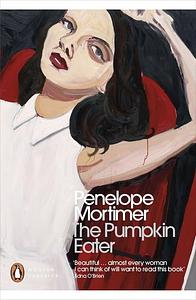Take a photo of a barcode or cover
emotional
funny
slow-paced
Plot or Character Driven:
A mix
Strong character development:
No
Loveable characters:
Complicated
Diverse cast of characters:
No
Flaws of characters a main focus:
Yes
emotional
reflective
sad
fast-paced
The narrator, known to us only as Mrs Armitage, recounts to the reader the collapse of her fourth marriage, after thirteen years, to her unfaithful husband. This writing feels exceedingly modern, and Mortimer's honest and heartbreaking dissection of women's loss of identity, or failure to secure one, in the wake of marriage and motherhood is wonderfully raw as it is bleak. She writes of women's role in sex in a reality so often overlooked - the narrator's many children being used as a vice, to give her a purpose she does not know if she wants, and to make sex something that is not painful for her. I just love reading women's writing about women, about their weaknesses that are not their own, their failures that they blame themselves for, their relationships that they destroy themselves in.
Dear Mrs Evans, for God's sake teach me how to live. It's not that I've forgotten. It's that I never knew.[...] When we were young we said to hell with it and used our breasts as shields. But the tears fall so when they take away love. Be a man, Mrs Evans. It's all that's left for you. 'What's this?' Jake said. He glanced at the letter, taking it from me. It drifted into the wastepaper basket.[...]While he held me, I kept an eye on it; it contained the only evidence I had in the world that I was not alone.
Dear Mrs Evans, for God's sake teach me how to live. It's not that I've forgotten. It's that I never knew.[...] When we were young we said to hell with it and used our breasts as shields. But the tears fall so when they take away love. Be a man, Mrs Evans. It's all that's left for you. 'What's this?' Jake said. He glanced at the letter, taking it from me. It drifted into the wastepaper basket.[...]While he held me, I kept an eye on it; it contained the only evidence I had in the world that I was not alone.
challenging
emotional
mysterious
reflective
slow-paced
Plot or Character Driven:
Character
Strong character development:
Yes
Loveable characters:
Complicated
Diverse cast of characters:
Complicated
Flaws of characters a main focus:
Yes
emotional
reflective
tense
slow-paced
Plot or Character Driven:
A mix
Flaws of characters a main focus:
Yes
Some parts are brilliant, some parts are a pretentious slog
dark
sad
medium-paced
Plot or Character Driven:
Character
Strong character development:
Complicated
Loveable characters:
Complicated
Diverse cast of characters:
Yes
Flaws of characters a main focus:
Complicated
Like Daddy's Gone A-Hunting, a dark look into the mind of a woman in psychic pain.
emotional
sad
medium-paced
Plot or Character Driven:
Character
Strong character development:
Yes
Loveable characters:
No
Diverse cast of characters:
No
Flaws of characters a main focus:
Complicated
dark
emotional
mysterious
reflective
sad
tense
slow-paced
Plot or Character Driven:
Character
Strong character development:
No
Loveable characters:
No
Diverse cast of characters:
No
Flaws of characters a main focus:
Yes
dark
emotional
funny
reflective
sad
tense
medium-paced
Plot or Character Driven:
Character
Strong character development:
Yes
Loveable characters:
Complicated
Diverse cast of characters:
No
Flaws of characters a main focus:
Yes
In the Pumpkin Eater, Mrs Armitage (who has been a wife of many, and a mother to infinitely more), addresses the reader directly in an attempt to rationalise her mental breakdown, triggered by her husband's unfaithfulness. She takes us with her in her reflections on her past (and current) husbands, her experiences of her own sexuality as she was coming of age, and her attempts to reconcile with the object of her obsessional love - Mr Jake Armitage. Although she later alludes to her position as an unreliable narrator, the reader is brought intimately close to her fears and pain. It is her almost conspirational tone and good humour that make this such an addictive read, rather than the trauma she shares. I have seen some reviews level criticism at the depth of the character, but for me Mrs A felt true and developed, as a woman in the midst of the confusion and desolation of losing a partner that for her, constituted life itself. Indeed, The Pumpkin Eater is autofictional, with much of the plot following Mortimer's experience with her great love and husband, John Mortimer (just minus a few dozen of the children).
Named after a deliciously dark nursery rhyme, my expectations for The Pumpkin Eater were in the realm of Angela Carter, Jeanette Winterson and Margaret Atwood. Whilst not quite meeting this mark, this slim novel does indeed have an eerie, slightly absurd tone, perverting fairytale tropes, such as the glass tower that our protagonist finds herself escaping to, rather than from, and her rather uncanny 'army' of children. And yet, some of the most disquieting parts of the tale are those rooted in the real world, even where she seems to bring them upon herself.
Mortimer writes beautifully, and I found that one passage, which describes the detritus left behind by one of Mr Armitage's conquests really reminded me of the sticky, sultry, wickedly voyeuristic descriptions in the Virgin Suicides, but in this context embodying the hatred, disgust, jealousy and distance of a betrayed wife:
"I thought of Philpot's bedroom in our house: the layers of grime-edged broderie anglaise flung over the unmade bed, the spilled powder, little stumps of lipstick and unstoppered deodorants."
In her flashbacks, we learn how Mrs Armitage develops the notion of love/man as salvation and goodness, particularly in opposition to her self, reducing the object of her obsessive love to an all-encompassing concept, that ultimately cannot save her and become her total meaning in life.
"It must have been then, I think, that Jake and life became confused in my mind, and inseparable. The sleeping man was no longer accessible, no longer lovable. He increased monstrously, became the sky, the earth, the enemy, the unknown. It was Jake I was frightened of; Jake who terrified me; Jake who in the end would survive."
Despite being extolled for it's feminist virtues, TPE will leave modern readers with a lot to be desired on this front. Whilst Mortimer's observations of the interactions, misunderstandings and power dynamics operating between different men and women in 1960s society are spot-on, she certainly centres the middle-upper class white female experience, and unsurprisingly some language choices are outdated and hard to read.
However, I do think this could really work for readers who enjoy Depressed Woman Moving / female rage / toxic obsessional love lit-fic. So if you liked Acts of Desperation, The Bell Jar, My Year of Rest and Relaxation, etc. this might work for you!
Themes: mental health, male-female relationships, obsessional love, control, power dynamics, unreliable narrators, the sexism imbedded within psychology and ideas of hysteria, (devaluing of) motherhood, mothering your partner, girlhood, sexuality.
Named after a deliciously dark nursery rhyme, my expectations for The Pumpkin Eater were in the realm of Angela Carter, Jeanette Winterson and Margaret Atwood. Whilst not quite meeting this mark, this slim novel does indeed have an eerie, slightly absurd tone, perverting fairytale tropes, such as the glass tower that our protagonist finds herself escaping to, rather than from, and her rather uncanny 'army' of children. And yet, some of the most disquieting parts of the tale are those rooted in the real world, even where she seems to bring them upon herself.
Mortimer writes beautifully, and I found that one passage, which describes the detritus left behind by one of Mr Armitage's conquests really reminded me of the sticky, sultry, wickedly voyeuristic descriptions in the Virgin Suicides, but in this context embodying the hatred, disgust, jealousy and distance of a betrayed wife:
"I thought of Philpot's bedroom in our house: the layers of grime-edged broderie anglaise flung over the unmade bed, the spilled powder, little stumps of lipstick and unstoppered deodorants."
In her flashbacks, we learn how Mrs Armitage develops the notion of love/man as salvation and goodness, particularly in opposition to her self, reducing the object of her obsessive love to an all-encompassing concept, that ultimately cannot save her and become her total meaning in life.
"It must have been then, I think, that Jake and life became confused in my mind, and inseparable. The sleeping man was no longer accessible, no longer lovable. He increased monstrously, became the sky, the earth, the enemy, the unknown. It was Jake I was frightened of; Jake who terrified me; Jake who in the end would survive."
Despite being extolled for it's feminist virtues, TPE will leave modern readers with a lot to be desired on this front. Whilst Mortimer's observations of the interactions, misunderstandings and power dynamics operating between different men and women in 1960s society are spot-on, she certainly centres the middle-upper class white female experience, and unsurprisingly some language choices are outdated and hard to read.
However, I do think this could really work for readers who enjoy Depressed Woman Moving / female rage / toxic obsessional love lit-fic. So if you liked Acts of Desperation, The Bell Jar, My Year of Rest and Relaxation, etc. this might work for you!
Themes: mental health, male-female relationships, obsessional love, control, power dynamics, unreliable narrators, the sexism imbedded within psychology and ideas of hysteria, (devaluing of) motherhood, mothering your partner, girlhood, sexuality.
An alright semi-autobiographical look at a marriage riddled with classist, racist whiny garbage. This is everything wrong with white feminism.






